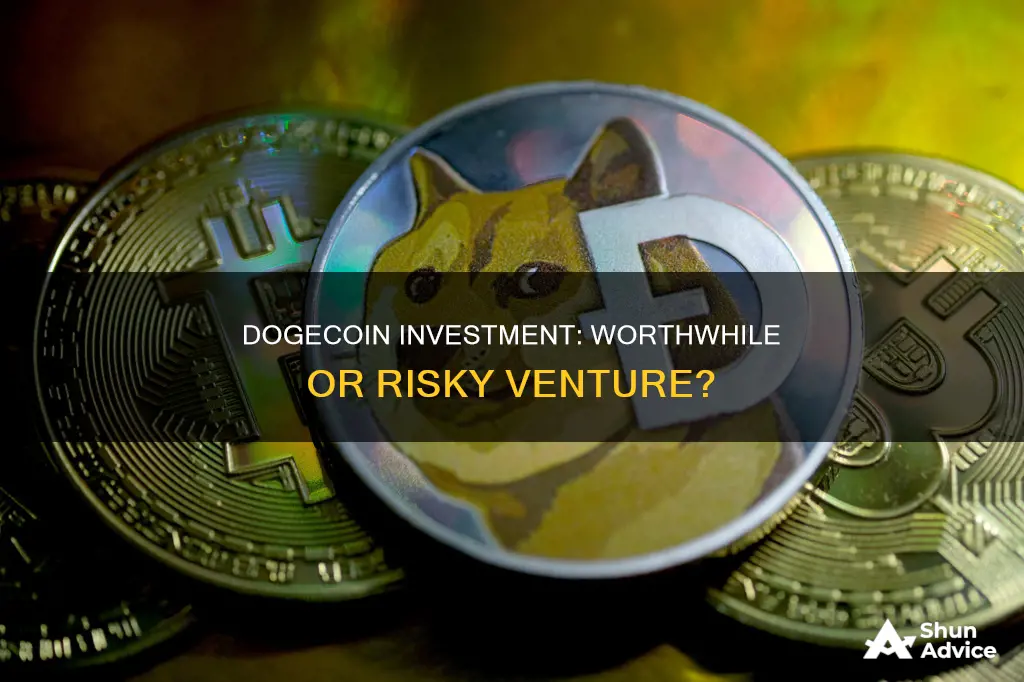
Dogecoin is a cryptocurrency that was created as a joke in 2013. It is based on the popular Doge memes that were popular at the time and features a Shiba Inu dog. Dogecoin has since become one of the most popular cryptocurrencies, with a large and passionate community of followers. It is also one of the most abundant cryptos in existence, with a circulating supply of over 100 billion coins.
Dogecoin has experienced volatile price movements since its creation. In 2021, it reached an all-time high of around $70 billion in market capitalization due in part to endorsements from celebrities such as Elon Musk. However, its value has declined since then, and as of 2024, it is trading at around $0.10 per coin.
Despite its popularity, Dogecoin is considered a risky and speculative investment due to its limited utility and dependence on social media influence and market trends. It is often viewed as a short-term trading opportunity rather than a long-term investment.
Those considering investing in Dogecoin should be aware of the high risks involved and conduct thorough research before making any decisions.
| Characteristics | Values |
|---|---|
| Price | Currently trading at around $0.10 per coin |
| Market Capitalization | $10 billion |
| Use Cases | Limited utility; used as a payment system; faster and cheaper transactions than Bitcoin |
| Community | Over 4 million token holders; 2.4 million subscribers on Reddit |
| Celebrity Endorsements | Elon Musk, Snoop Dogg, Gene Simmons |
| Risk | Risky asset class; highly speculative; highly volatile |
What You'll Learn

Dogecoin's value and volatility
Dogecoin's value is largely derived from its meme status and passionate community. It has been supported by high-profile figures such as Elon Musk, who has been dubbed the 'Dogefather'. Musk has used his social media influence to drive up Dogecoin prices on several occasions. However, despite its popularity, Dogecoin is considered a less serious cryptocurrency than Bitcoin and is viewed as a highly speculative investment.
Dogecoin's value has fluctuated significantly over the years. In 2023, it was down 15.1% in 30 days and 10.3% year-to-date as of 24 August. Its price performance is particularly weak when compared to Bitcoin, with Dogecoin's famous volatility resulting in significant gains and losses for investors.
Dogecoin's volatility is a key factor in its value. Volatility refers to the frequency and extent of price changes within a specified period. Dogecoin is considered a highly volatile cryptocurrency, with its prices fluctuating rapidly and unpredictably. This volatility can present investment opportunities, as investors can take advantage of price fluctuations to make short-term gains. However, it also increases the risk of significant losses.
Dogecoin's future value is highly uncertain. Some investors believe that it will increase in value in the long term, especially if there is another crypto boom. Others argue that Dogecoin's popularity has peaked and that it lacks the utility and intrinsic value to be a viable long-term investment.
In summary, Dogecoin's value and volatility have been characterised by rapid and unpredictable changes. While its meme status and community support have driven up its value, Dogecoin is also highly volatile and susceptible to significant price drops. As such, it may be a risky long-term investment, but its volatility can present short-term investment opportunities for those willing to take on the risk.
Doge Coin Stock Investment: Where to Invest?
You may want to see also

Dogecoin's utility
Dogecoin is a peer-to-peer, open-source cryptocurrency with a loyal community of supporters who trade it and use it as a tipping currency for social media content. It is considered an "inflationary coin" with no supply cap, meaning there is no maximum Dogecoin supply.
Dogecoin has been used as a tipping currency for social media content, with its low fees and fast transaction speeds. It has also been used for charitable donations and humanitarian initiatives, such as raising $30,000 to help send the Jamaican bobsled team to the Winter Olympics, $50,000 to build water wells in Kenya, and $55,000 to sponsor NASCAR driver Josh Wise.
Dogecoin can be used to make purchases, although very few merchants accept it. Online retailers that do accept Dogecoin include Elon Musk's SpaceX and the Dallas Mavericks. Third-party providers such as BitPay and Coinbase have also integrated Dogecoin payment options for online stores. Dogecoin prepaid cards are also available, and shops can integrate directly with the Dogecoin blockchain through the JSON-RPC interface.
Dogecoin's blockchain uses the same proof-of-work mechanism as Bitcoin for adding data. Dogecoin mining is faster than Bitcoin mining and requires much less energy, resulting in a lower environmental impact. Dogecoin transactions are also much faster and cheaper than Bitcoin transactions.
Dogecoin's value is largely determined by its popularity, which can produce exciting short-term gains but does not indicate long-term investing success. Dogecoin is also highly volatile, making it a problematic long-term investment.
Bitcoin Crypto: A Good Investment Option?
You may want to see also

Dogecoin's community
Dogecoin has one of the largest communities of followers in the cryptocurrency space, with over four million token holders and 2.4 million subscribers on the r/dogecoin subreddit. The crypto's community is so strong that it has been dubbed the “People's Cryptocurrency".
Dogecoin Investment: Timing the Market for Maximum Returns
You may want to see also

Dogecoin's creators and backers
Dogecoin was created by software engineers Billy Markus and Jackson Palmer, who worked for IBM and Adobe, respectively. They decided to create a payment system as a joke, poking fun at the wild speculation in cryptocurrencies at the time. Dogecoin was introduced on December 6, 2013, and quickly developed its own online community, with a dedicated blog and forum, and its market value reached $8 million within two weeks.
Dogecoin is considered the first "meme coin", and its logo is the face of Kabosu, the dog from the "doge" meme. It is a peer-to-peer, open-source cryptocurrency with its blockchain based on Litecoin, using the same proof-of-work technology. Dogecoin has a loyal community of supporters who trade it and use it as a tipping currency for social media content.
Dogecoin has had several notable backers over the years, including Elon Musk, who has frequently tweeted about the cryptocurrency, causing its value to rise. Musk has also accepted Dogecoin as payment for some of his businesses, including SpaceX and Tesla merchandise. In 2021, the Dallas Mavericks NBA team, owned by Mark Cuban, also started accepting Dogecoin for tickets and products, becoming the top Dogecoin merchant with 20,000 transactions in two days.
Dogecoin's other backers include Vitalik Buterin, the co-founder of Ethereum, who joined the Dogecoin Foundation's board in 2021. The Dogecoin Foundation was re-established that year with a focus on supporting the Dogecoin community and ecosystem.
Raymond: Avoid Bitcoin for a Stable Financial Future
You may want to see also

Dogecoin's future
Dogecoin is a highly speculative cryptocurrency with few use cases. It was created as a joke in 2013 by software engineers Jackson Palmer and Billy Markus, who intended to satirise the hype surrounding cryptocurrencies. Dogecoin's logo is an image of a Shiba Inu dog, a popular internet meme at the time.
Despite its humorous origins, Dogecoin quickly gained a loyal following, and its community has completed several successful fundraisers. Dogecoin is also notable for its low transaction fees and fast transaction times, which make it a popular choice for online tipping and micropayments.
Dogecoin's value is largely based on speculation, and it has experienced significant volatility since its creation. Its price movements are often linked to social media activity, particularly tweets by Elon Musk, who has been a prominent supporter of the cryptocurrency. In 2021, Musk's tweets helped Dogecoin reach an all-time high market cap of around $70 billion.
However, Dogecoin's value has declined considerably since its peak, and it is now considered a risky investment option. Its limited utility and speculative nature make it a questionable choice for long-term investors.
That being said, Dogecoin has a passionate community of supporters, and its low price makes it an attractive option for those looking to diversify their cryptocurrency portfolio. It is also one of the most established cryptocurrencies, with a longer track record than most top 10 cryptocurrencies by market capitalisation.
Looking ahead, Dogecoin's future is uncertain. On the one hand, it has a strong community and high brand recognition. On the other hand, it faces increasing competition from other cryptocurrencies with more use cases and better technology.
Some analysts predict that Dogecoin could see another surge in value during the next crypto bull run, while others believe its best days are behind it. The cryptocurrency markets are notoriously unpredictable, and Dogecoin's value could rise or fall dramatically in the coming years.
In summary, Dogecoin's future will likely depend on maintaining its passionate community and whether it can evolve to have more utility and use cases. While it may not be a good option for long-term investors, it could still offer short-term speculative opportunities for those willing to accept the risk.
A Beginner's Guide to Investing in Bitcoin with GBTC
You may want to see also
Frequently asked questions
Dogecoin is a risky asset with few use cases. It is a speculative meme coin with little utility, so investors should consider the high risk involved before investing.
Dogecoin is currently trading at a huge discount compared to its former highs. It can be snapped up for under $0.10 per token, a stark contrast to when it was valued at $0.74 at its peak in 2021. This represents a discount of over 85%.
Dogecoin is considered more of a short-term speculative asset, but it does have a strong community and its widespread adoption is growing rapidly. Its long-term investment potential seems positive due to its active community, acceptance by brands, and consistent market presence.







